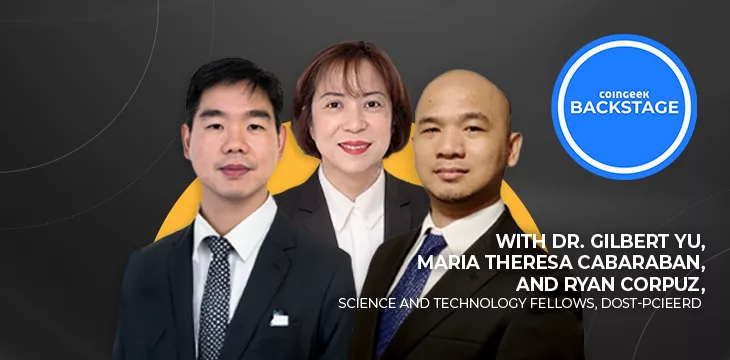|
Getting your Trinity Audio player ready...
|
From government to enterprises, there’s no stopping the Philippines from exploring and harnessing the full potential of blockchain, with authorities from the Department of Science and Technology (DOST) now looking into utilizing the technology to transform the research and development sector and the science industry.
Three officials from the DOST sat with CoinGeek Backstage to share their insights on blockchain following a brief seminar on the basics of the emerging technology offered by nChain.
Science and technology fellow at the DOST Philippine Council for Industry, Energy, and Emerging Technology Research and Development (DOST-PCIEERD), Dr. Gilbert Yu, rallied local scientists with a background in blockchain or who have studied the technology overseas to support the department in its science and technology endeavors under the Balik Scientist Program (BSP).
Fellow DOCT-PCIEERD official Maria Theresa Cabaraban said the latest initiative will also be beneficial to help the Philippines build its blockchain talent pool.
The BSP was established after the DOST’s call for proposals with the Philippine Council for Health Research and Development (PCHRD) in 2022 showed a lack of local experts with background on emerging technologies.
“Most of these people engaged in blockchain technology here in the country are mostly enthusiasts,” Dr. Yu noted. “Right now, we’re trying to figure out how we can entice our blockchain technology expert elsewhere to lend us a hand in beefing up our knowledge on blockchain.”
While building the country’s talent pool is vital, DOST-PCIEERD’s Ryan Corpuz said it is equally important to establish a clear path on blockchain use.
“It appears to me that it might be contradictory to [the] centralized government we have,” Corpuz said, pointing out that blockchain’s concept is built on decentralization.
“Now, the question is, who will control this technology, and what kind of information are we allowed to share?” he asked.
Corpuz added that there should be a consensus among politicians and experts on how the technology will be used, build Filipinos’ common knowledge on the blockchain, and address security issues tied to the network, including matters surrounding control.
“I believe this blockchain technology is very interesting, but we need to educate more the public,” stated Corpuz, adding that the tool could be dangerous if mishandled.
Meanwhile, Cabaraban said the most interesting point she picked up during nChain’s Blockchain Immersion Program (BIP) is digital identity and how the technology brings back the power to Filipinos in terms of what data to share.
The DOST officials said they look forward to learning more about blockchain to support future science and technology initiatives, which nChain said it was willing to provide whenever needed.
DOST Senior Science Research Specialist Gennie Ordona also shared with CoinGeek Backstage reporter Claire Celdran her experience in attending the nChain forum, including what blockchain applications government agencies should work on.
Citing the struggle in verifying data, Ordona said the national government and state-backed agencies should utilize blockchain to simplify and hasten data verification in the country, which could sometimes take weeks before being validated.
Currently, the DOST is in the process of developing a blockchain-based system that would help with data verification before fully integrating it into its operations.
For Ordona, the forum is more than just an avenue to build the Philippines’ expertise in blockchain technology; it works as a platform to help the country develop its blockchain applications.
Watch: The Philippines is moving toward blockchain-enabled tech

 07-12-2025
07-12-2025 





